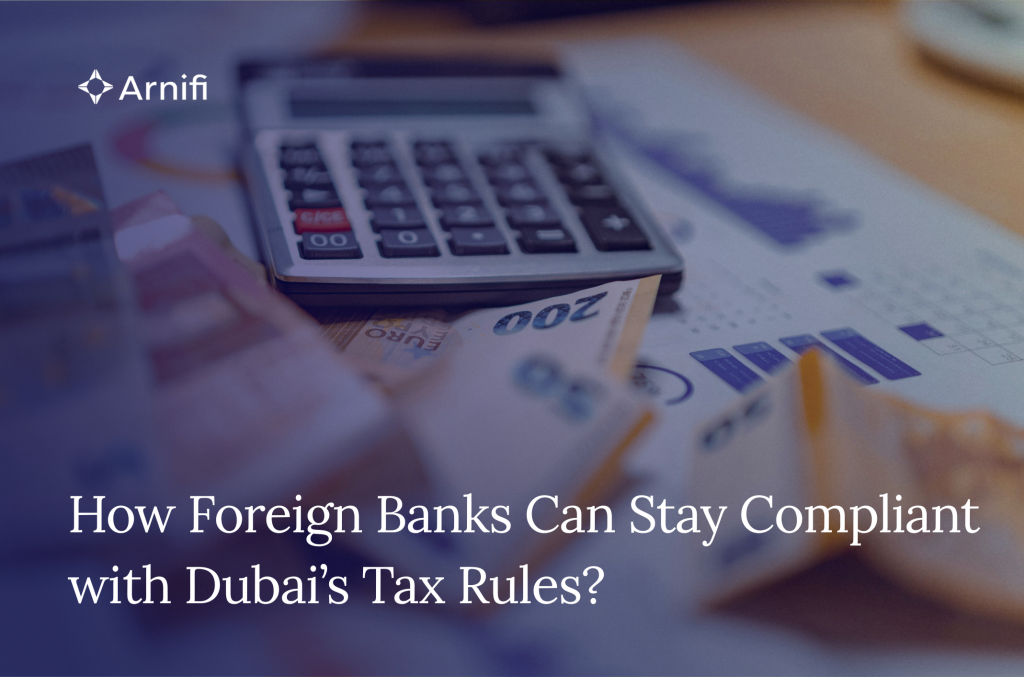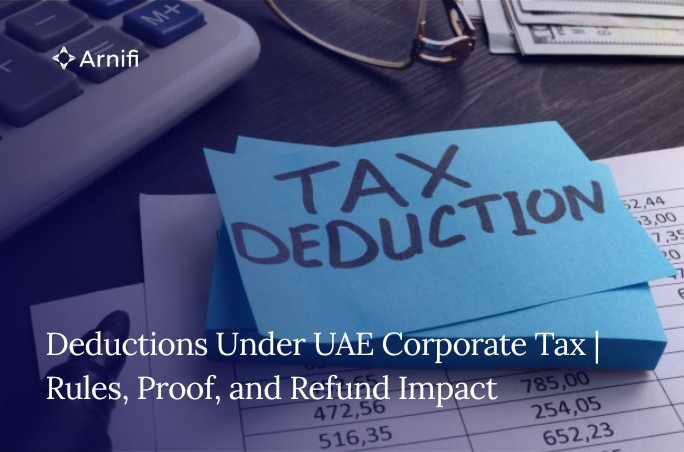How Foreign Banks Can Stay Compliant with Dubai’s Tax Rules?
by Shethana Nov 21, 2025  8 MIN READ
8 MIN READ

Foreign banks in Dubai operate under Dubai tax rules that keep expanding each year. Corporate tax, VAT, economic substance and anti avoidance rules now sit beside Central Bank supervision requirements.
Under the VAT and federal tax penalty framework, errors and late payments can attract fines that scale up to 300% of the unpaid tax, alongside fixed penalties (for example, AED 10,000-20,000 for repeated violations).
Branches and subsidiaries must align group policies with UAE specific filing calendars and documentation standards while considering EmaraTax workflows.
This article explains the main obligations for foreign and international banks, and highlights practical risk points. Let’s learn to set out governance steps that help boards maintain control and assurance over tax positions and reporting quality, and cherish Dubai tax rules for international banks.
Table of contents
- Dubai Tax Rate For Foreign Banks
- 1. Tax Landscape For Foreign And International Banks In Dubai
- 2. Corporate Tax Rules For Foreign Banks And Their Branches
- 3. VAT Treatment Of Banking And Financial Services
- 4. Economic Substance And Transfer Pricing Expectations
- 5. Governance, EmaraTax and Local Reporting Discipline
- What are DTCM Tax Dubai Rules
- How Arnifi Helps Foreign Banks Navigate Dubai Tax Rules
- FAQs
Dubai Tax Rate For Foreign Banks
Recent Dubai rules set a 20 percent tax rate on taxable income for foreign banks that operate in the emirate. This sits on top of the federal Corporate Tax system and applies to branches and other foreign bank structures that fall under the Dubai law.
Corporate Tax already paid under the federal regime reduces the 20 percent bill. The remaining balance is payable under the emirate rules. Because of this overlay, tax planning for foreign banks in Dubai must look at both Corporate Tax and the specific foreign bank law, not at either in isolation.
Core Compliance Duties For Foreign Banks In Dubai
Key compliance duties under Dubai tax rules for foreign banks include:
- Filing tax returns in the correct format, with audited financial statements, clarifications and a clear calculation of taxable income and tax due.
- Keeping financial statements audited by external auditors so figures in returns match signed accounts.
- Using voluntary declarations to correct errors in earlier returns and paying any difference within the allowed time window.
- Cooperating with tax audits, keeping core documents ready, and raising objections in time when the bank disagrees with an assessment or a penalty.
1. Tax Landscape For Foreign And International Banks In Dubai
Dubai does not operate a city specific income tax on banks. Instead, foreign banks fall under the federal UAE Corporate Tax Law, federal VAT rules and national Economic Substance Regulations, while also observing Central Bank and free zone regulations.
The Corporate Tax Law applies from financial years beginning on or after 1 June 2023 and imposes 0 percent on taxable income up to AED 375,000 and 9 percent on income above that level.
As per the new tax rules in Dubai, large multinational banking groups operating in Dubai may also face a 15 percent domestic minimum top up tax from 2025.
VAT at 5 percent applies to many fee based services, while several margin based financial services remain exempt.
On top of this, the Economic Substance Regulations treat banking business as a “relevant activity”, requiring substance tests, annual notifications and reports.
Foreign banks based in hospitality or tourism chains should also monitor local Dubai levies such as the Tourism Dirham. This levy ranges roughly between AED 7 and AED 20 per room per night and is collected under DTCM rules.
For a foreign bank, compliance is therefore an integrated exercise rather than a single tax question.
2. Corporate Tax Rules For Foreign Banks And Their Branches
A foreign bank can operate in Dubai through a locally incorporated subsidiary, a branch licensed by the Central Bank or a free zone entity, often within DIFC. Each structure produces a different Corporate Tax outcome.
Resident juridical entities and foreign branches with a permanent establishment in the UAE are generally subject to Corporate Tax on income attributable to their local activities.
Free zone entities can qualify for a 0 percent rate on “qualifying income” if they meet strict tests as a Qualifying Free Zone Person; non-qualifying income is taxed at 9 percent.
Banks and similar financial institutions in free zones often fall outside parts of the 0 percent regime where they conduct domestic banking activities. Else, they are taxed at 9 percent on permanent establishment profits outside the free zone.
Foreign groups must map each legal entity and branch and identify all sources of UAE income. They then classify income into qualifying and non-qualifying buckets and mark any out of scope items before setting up their EmaraTax registrations.
Corporate Tax Checklist For Foreign Banks
- Confirm which UAE entities and branches fall within the Corporate Tax net and classify them as mainland or free zones.
- Map income streams into qualifying, non qualifying and exempt categories, including treasury operations and intra group funding.
- Review accounting policies for loan impairments, fee recognition and fair value movements to ensure consistent tax adjustments.
- Check exposure to domestic minimum top up tax for groups above the Pillar Two revenue threshold.
3. VAT Treatment Of Banking And Financial Services
VAT applies unevenly across banking products, so system configuration matters. Margin-based lending and deposits are generally exempt, while fee services and many structured products are taxed at 5 percent.
Imported services such as group IT usually trigger reverse charge VAT in the Dubai branch. FTA guidance also lets SWIFT messages act as tax invoices in some cases, so foreign banks must configure VAT codes carefully in core systems.
These points mean that foreign banks must carefully configure VAT codes in core banking and payment systems and ensure they reconcile VAT ledgers with EmaraTax returns.
VAT Risk Points For Foreign Banks
- Misclassification of fee based products as VAT exempt, leading to underpaid output tax.
- Failure to apply reverse charge VAT on imported services such as global licence fees or consulting support.
- Weak documentation of place of supply and customer status for cross border transactions.
- Inadequate evidence that VAT exempt transactions genuinely operate on an implicit margin or spread basis.
4. Economic Substance And Transfer Pricing Expectations
Banking is explicitly listed as a relevant activity under the Economic Substance Regulations. So foreign banks with UAE entities or branches that earn banking income must meet substance tests.
Economic substance tests need enough staff, spend and premises in the UAE, with boards directing work locally and filing yearly notices with the right authority. At the same time, related party deals with head offices, treasury hubs and service firms face transfer pricing review, so foreign banks should use one joined up functional analysis for substance, pricing and capital models.
Economic Substance And Transfer Pricing Priorities
- Identify which entities and branches perform banking, headquarters, leasing or other relevant activities.
- Prepare substance documentation that explains staffing, decision making and risk management in Dubai.
- Build transfer pricing models for funding, guarantees and support services that match real behaviour.
- Align Corporate Tax, ESR and regulatory returns so numbers and narratives stay consistent.
5. Governance, EmaraTax and Local Reporting Discipline
Dubai based branches and subsidiaries of foreign banks often have sophisticated global reporting systems. Yet local tax governance can lag if policies are not tailored for UAE rules.
EmaraTax now centralises corporate tax, VAT and some other federal interactions, including registration, return filing, payment and refund processes.
Incorrect profiles, conflicting contact details or fragmented accounts across different licences can delay refunds and complicate audits.
Foreign banks should embed UAE tax governance into their broader risk frameworks:
- Assign clear accountability for tax compliance in the UAE, typically a local head of tax or finance supported by group specialists.
- Maintain local tax risk registers that cover filing deadlines, audit trends and rule changes, including ministerial decisions and FTA guides.
- Use compliance calendars that integrate Central Bank, free zone and EmaraTax deadlines so reporting peaks are predictable.
- Run periodic internal reviews of sample tax returns, ESR reports and key invoice formats to ensure alignment with current rules.
What are DTCM Tax Dubai Rules
The fee is calculated per room, per night, and the amount depends on the classification (star rating) of the accommodation.
| Accommodation Category | Tourism Dirham Fee (AED) Per Room, Per Night |
| 5 Star / Deluxe Hotel | AED 20 |
| 4 Star / Superior Hotel | AED 15 |
| 3 Star, 2 Star, 1 Star | AED 10 |
| Hotel Apartments (Deluxe) | AED 20 |
| Hotel Apartments (Standard) | AED 15 |
| Holiday Homes (Deluxe) | AED 15 |
| Holiday Homes (Standard) | AED 10 |
How Arnifi Helps Foreign Banks Navigate Dubai Tax Rules
Arnifi works with international banks that run branches or entities in Dubai and need support to meet UAE tax rules while staying aligned with group policy.
We begin with a review of legal structure, licences, free zone status and EmaraTax profiles, then map Corporate Tax, VAT, ESR and top up exposure.
Our team designs tax governance, supports filings and keeps working papers that tie returns to ledgers and contracts.
FAQs
Are foreign bank branches treated as residents for tax?
UAE branches are generally taxed on income attributable to their local presence, similar to resident companies under the corporate tax law.
Which main taxes affect foreign banks in Dubai?
Corporate tax on profits, VAT on many fee based services, plus economic substance rules for banking business and other relevant activities also.
Do free zone banks always get zero corporate tax?
No. Qualifying Free Zone Persons meeting substance tests get zero tax on qualifying income; other income is taxed at nine percent.
When does the fifteen percent minimum top up tax matter for foreign banks?
Groups above the revenue threshold under Pillar Two may face domestic top up tax in the UAE.
Why do foreign banks appoint a local tax adviser in Dubai?Advisers track rule changes, manage EmaraTax filings and explain positions during reviews so management can stay focused on operations.
Top UAE Packages

Related Articles
Top UAE Packages



